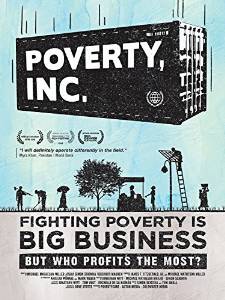Poverty, Inc. (2014)
If you have followed the debates about the international aid industry and efforts to address global poverty, then you will be familiar with the important message of this documentary movie — most of the players agree that the system is broken, often times the current model makes things worse, the system has its own vested interests, and there still remains a sort of sentimental paternalism or neo-colonialism toward the aid recipients. A wide variety of very different do-gooders receive harsh criticisms — the IMF and the World Bank, monster NGOs like World Vision, local church projects, rock stars like Bono, celebrities like Angelina Jolie, social entrepreneurs like the founder of Toms Shoes, charities, the US farm lobby, and even conservationists. President Clinton admits in the film that it was a huge mistake to dump free rice into Haiti after the earthquake there — it killed the local market, dried up demand, ruined capacity, and put locals out of work. Those unemployed rice farmers then moved to the overcrowded cities looking for work. Ideally, Haiti would like to grow and export rice. Same for those free Toms Shoes. Why produce or pay for rice and shoes locally when they come for free globally?! Alternately, the film showcases positive examples of local entrepreneurs. The film also raises many issues like bad governance, local corruption, over population, widespread illiteracy, environmental degradation, and rule of law, huge problems of complexity and scalability that won't be solved just by creative start-ups. There's an important footnote to this film — it was produced by the Acton Institute, a think tank that promotes free market capitalism and libertarian policies. For our own "Journey with Jesus" take on ending extreme poverty, see our interview with Dianne Calvi, and the list of ten related book reviews about development here.


